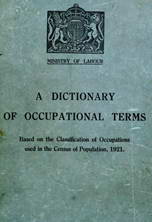A Dictionary of Occupational Terms Based on the Classification of Occupations used in the Census of Population, 1921.

ORDER XXII.—PERSONS EMPLOYED IN TRANSPORT AND COMMUNICATION
Sub-order 2.—Road Transport Workers
720.—Drivers of Motor-Cars, Omnibuses, Vans and Lorries
Back to List of Occupational Codes
(Compare Similar Occupational Terms In Connection With Motor Driven Vehicles In Code 719.)
- carrier (country)
- is owner of a motor-van in which he conveys passengers, goods and produce from villages along a certain route to a market town.
- chauffeur, chauffeuse
- a motor-car driver q.v., usually in private service and wearing uniform; often employed part time in other duties, e.g. carrying messages, parcels, etc., or shopping for his/her employer, or as gardener or indoor servant.
- chauffeur mechanic
- a chauffeur q.v. with some knowledge of motor engineering, and able to undertake running repairs.
- driver, ambulance (motor)
- drives motor ambulance for hospital, local authority, or Red Cross Society; assists in carrying patients into and out of ambulance; is sometimes also required to keep watch and to answer calls for ambulance.
- driver, cab (motor); motor cab driver
- drives motor-propelled cab, for public hire, under licence from local authority; cf. driver, taxi-cab.
- driver, car driver (motor), motor car driver
- drives light motor-propelled vehicle as distinguished from van, lorry, omnibus or motor coach; cleans and oils car; fills petrol and oil tanks; carries out minor adjustments of engine, transmission, etc.; changes tyres, and (if pneumatic) repairs them and pumps up when necessary.
- driver, copper van (tramways)
- a motor driver q.v. who drives motor-van used by bronze coin distributor (729) q.v. on his rounds.
- driver, motor driver
- general terms applicable to any driver of motor-propelled vehicle, but more generally to drivers of heavier vehicles, e.g. vans, lorries, etc., used for commercial purposes; steers free course on road by turning steering wheel; controls. power of engine by hand and foot levers; applies hand or foot brake in emergency; sometimes specifically designated, e.g. electric van driver, mail driver, mail van driver, lorry driver, motor lorry driver, motor wagon driver, petrol lorry driver, motor van driver, van driver, motor wherry (dray) driver, motor sweeper (road) driver, oil tank driver.
- driver, motor char-a-banc
- drives a motor char-a-banc (motor coach), licensed to carry a number of people (usually from 15 to 40), sometimes between regular stages, but more usually on special pleasure trips; sometimes also acts as conductor (724) q.v.
- driver, motor rolley; motor rully driver
- drives motor rolley (small motor vehicle) running on light railway or tramway.
- driver, motor water-cart
- drives water-cart, propelled by internal-combustion engine; waters a specified length of roadways, as directed by road foreman (561) q.v. or other official; controls strength and direction of jets of water; fills tank in water cart with hose from water main.
- driver, omnibus driver (motor); motor omnibus driver
- drives omnibus, propelled by internal-combustion engine, starting and stopping at specified points on the road and/or in obedience to bell-signals from the conductor; sometimes specifically designated, e.g. electric omnibus driver, petrol-electric omnibus driver.
- driver, overhead wagon (motor)
; tower wagon driver (motor)
- as for driver, overhead wagon (719).
- driver, owner (taxi); taxi-owner driver
- a taxi-cab driver q.v. who owns (or hires on hire purchase system) cab which he drives.
- driver, rail-less car or tram
- drives electric vehicle along highways, to convey passengers, such vehicle pursuing free course, i.e. not on rails, and gathering current by trolley from a fixed overhead wire; as for motorman (tramways) (722).
- driver, taxi-cab
- a cab driver (motor) q.v. whose vehicle is fitted with a taximeter (an automatic apparatus which indicates mileage run and fares due); hires from proprietor at fixed daily charges or is employed at fixed weekly wage; stands with cab at recognised cab-rank, in public thorougfare [sic] or at railway station, awaiting turn to be hired or drives slowly (crawls) along roadways; collects fares and charges from passengers and hands over to employer prescribed amount as recorded by taxi-meter; term includes owner driver (taxi) q.v.
- driver, tower wagon (motor)
- see driver, overhead wagon (motor).
- market carrier (motor)
- a motor driver q.v. who drives motor van or lorry, used for conveyance of produce to market, or from market to retailer.
- milk collector
- a motor driver q.v. who drives a lorry, collects milk from farmers, and takes it to a depot or railway station.
- motor driver's assistant
- accompanies motor driver q.v.; is generally an efficient driver, and takes place of driver in case of need; assists in loading and unloading lorry or van, cranking-up motor, execution of roadside repairs; is responsible, with driver, for ensuring that lorry or van is never left unattended when in use.
- railway carrier (motor)
- a motor driver q.v. employed, either by railway company or local railway contractor, lo collect or distribute goods in area served by railway station.
- sack collector (motor)
- a motor driver q.v. who drives motor vehicle in which he collects empty sacks or bags from customers of his employers; cf. sack collector (719).
Back to List of Occupational Codes
From:
A Dictionary of Occupational Terms Based on the Classification of Occupations used in the Census of Population, 1921,
Ministry of Labour, 1927. Digitised by Peter Christian, August, 2016. This text is in the Public Domain. 
